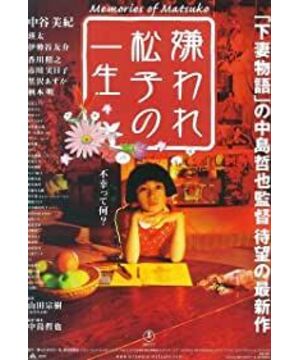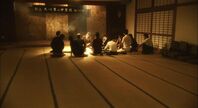After watching the film "The Life of the Disgusted Matsuko", I have seen brief comments from several friends, such as Miki Nakatani's image is damaged or I have seen the Japanese drama version. Although he had doubts, he didn't intend to dig into the bull's horn, so he buried it and watched it. I have seen director Tetsuya Nakajima's "The Story of My Wife", which seems to be the first Japanese film I have seen in the cinema. The impression is not good or bad, I always feel that fashion is a little popular, but I am very impressed with the director's use of color, gorgeous editing, and playing with shots.
In fact, I have already made up my mind not to be moved by the bitter scenes. For a long time, especially the first half of the troubles, I even imagined "The Story of My Wife" in general: I only use the confusion of youth as a self-deception that makes fun of it. . It is undeniable that youth should be like this, but the Loli costumes and Rococo of the people in the play are not what I want to see.
When I saw someone said that I cried at the end of "The Story of My Wife", I recalled the yawning at that time, and I was a little puzzled; after watching "The Life of the Disgusted Matsuko", I was basically sure that it was in the top three tear gas films in 2006. There's got to be a place for it, especially in female audiences - most of whom can get their tear ducts to work. This conclusion is well-founded. Last year, a Japanese long and pure love film "About the Rainy Season" ("Now, I Want to See You") was unexpectedly hot. "The Life of the Disgusted Matsuko" contains many elements, including heartbreak fairy tales, sister complexes, songs and dances, rich special effects, time and space travel, narrative transformation, and biographical themes. , but they serve only one object: the tragic story, the life of Matsuko, the fate of women and the hardships born for love.
Not only because of the integrity of the story structure, but also because of the large number of passages with songs and dances that are pleasing enough to stay close to the plot without being sleepy. Serious themes are exaggerated, and the tragic life is described with a splicing effect. The film itself is a tragedy, but it is forced to be so happy that most of the time, the audience may have a sense of absurdity. Apart from being unkind to others, Songko's tragedy is also largely due to her own personality, and it may even be the natural weakness of most women. They are too innocent, so innocent that they are almost childish. Believing in love is far from being a moth to a flame once or twice. The love of love, at all costs, goes through fire and water like a fever. The emotional excesses directly directed the setbacks in her life. Although she has not lost some beliefs at the end of her life, it is too late.
The completeness of the screenwriting structure is reflected in the different paragraphs of Matsuko's life. The stories of several men I met reached a harmonious unity before and after. My own students and suicide writers. The two stories are echoed before and after. It is a lyrical chapter of the story finally ascending to heaven, like a hymn, and the soundtrack is long-lasting. Probably left enough time for the audience and friends to shed tears. At this time, the story is already over.
Matsuko followed the overhead camera along the river from the end of her life to the beginning: her sister who was sick in bed, her father who had a grudge, her brother who didn't speak much, and even a nephew who she saw only once. Unable to find where she belongs, she washed her face in tears for many years in the last years of her life, trapped in the past and unable to extricate herself.
In a sense, pine nuts are ordinary, humble and trivial. The student's seemingly accidental lie hit her at the heart; the man she met failed to bring happiness, so she was down and alone and died of loneliness. Seriously, this is not just bad luck.
Even though the carrier of television has appeared many times, the film still hides the influence of the background of the times. The specific year is obvious, but it is not directly involved in Songzi's life, and there is no accusation in the sky. The life of Matsuko placed in front of the audience is a suffering tragedy (the director borrowed the role of Long Yangyi to throw this point), so pure and empty that it should not survive in the world. She used to be beautiful and sexy, someone pursued, someone obsessed. Every love story did not end well. Thinking of being loved, he gave his love unreservedly. The conflict reached a climax in the episode of reuniting with Longyang. The tortured self-sacrifice directly led to the brokenness of the rest of their lives (similar to a bridge paragraphs of other works are not uncommon). Of course, she also gave up in moderation, such as the barber section. At the end, Matsuko stood on the stage and called the curtain again. His life was like an adult version of a fairy tale, allowing the audience to withdraw from the film's emotions in time.
On the one hand, her quality is so pure that it can only exist in the movie (tolerance for the student Long Yangyi), on the other hand, she can't restrain her seeking to be loved (grimace of her father and jealousy of her sister). As a body, she is Self-conflict, not personality perfection. Once the perfect pine nut will not escape, will not be far from misunderstanding and start over. She chose to escape from the love she lost - running away for a plot is not enough but it is not out of the ordinary (personally envisaged extraordinary behavior is that she also makes herself sick in bed..., but this is very inconsistent with her temperament). He will not give up but stumble over and over again. To quantify it, Matsuko has written too many sad words in his life. The misfortune rooted in childhood is just an introduction. It is not hopeless but full of flowers and hope. The curtain call of one of her stage performances seems to be only to win a smile from her father, and it is ambiguous enough to understand from this point of view.
View more about Kiraware Matsuko no isshô reviews









